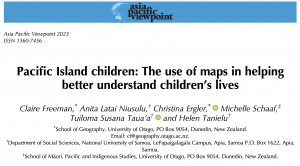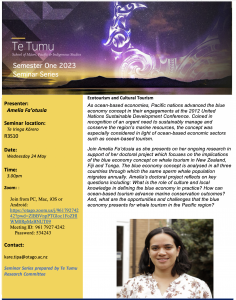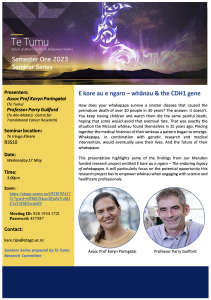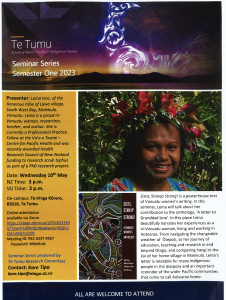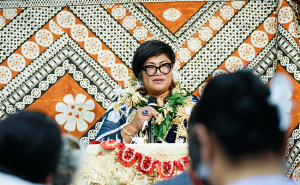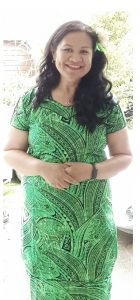Re-visioning Pacific research method/ologies in the new issue of Waka Kuaka (Journal of the Polynesian Society)
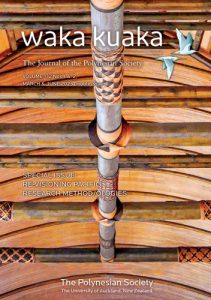
The beautiful lalava (lashings) created by Sopolemelama Filipe Tohi in the Fale Pasifika at the University of Auckland. (Picture by Julia Mageau Gray.) Click image to enlarge.
The Journal of the Polynesian Society has renewed its branding with the addition of its new name, Waka Kuaka. In the second issue, and first special issue under its new title, co-editors Dr Marcia Leenen-Young and Dr Lisa Uperesa of the University of Auckland gathered doctoral candidates and early career Pacific scholars from across Aotearoa, Te Waipounamu and Australia under the theme Re-Visioning Pacific Research Method/ologies. Three of our Te Tumu whānau were involved in the project. Dr Emma Powell and PhD candidate, Wanda Ieremia-Allan were both authors in the issue with their respective articles, “Tei te Akau Roa: An Ocean of Metaphor in Pacific Research Methodologies” and “Feiloa‘iga ma Talanoaga ma ‘āiga: Talanoa with Family in the Archives”. Professor Michael Reilly, a long-time member and supporter of the journal and society, also generously gave his feedback on Leenen-Young and Uperesa’s introduction.
In the words of the co-editors, the issue marks an “…historic shift in research practice and approaches for and by Pacific peoples and is intended to contribute new knowledge about how Pacific research methodologies and methods are being used (alone and in conjunction with other research approaches and methods). The contributions in [the] special issue help to illuminate the mutually constitutive relationship between theory and practice by sharing critical reflections and practical adaptations by early-career researchers who are raising considerations appropriate for the contemporary moment. In building on current knowledge, some deepen our understanding while others elaborate new approaches” (12).
The issue provided an opportunity for early career Pacific scholars to publish in an iconic journal of anthropology and related scholarly fields dedicated to Polynesia and the wider Pacific region. As a part of the issue’s production, the editors facilitated an innovative development and peer review process that was fully funded. The development of the special issue involved an online writing retreat, weekly 2.5 hour online writing sessions prior to draft submission, and a 1.5-day compulsory, in-person closed symposium for a double peer-review process. This was held at the Fale Pasifika in Auckland as was the launch of the issue which was held on 12 June 2023.
Collaborative Pacific research across schools and universities
It is great to see collaborative Pacific research by scholars across Otago’s schools and universities.The latest is a journal article in Asia Pacific Viewpoint featuring Te Tumu’s Dr Michelle Schaff, along with academic staff from the School of Geography and National University of Samoa on the use of maps in helping better understand Pacific children’s lives. Click here to view this open access article.
Abstract
Children’s voices have been little heard in the Pacific research. The United Nations Convention on the Rights of the Child 1989 asserts the child’s right to have a say on matters that affect them and for their views to be considered. There has been massive growth in technologically assisted participative research; however, we argue the value of hand drawn maps should not be underestimated in the rush to engage with more advanced techniques. We present data from 267 neighbourhood maps drawn by children in Fiji, Kiribati, Samoa and New Zealand. To better understand the social construction of knowledge in children’s everyday lives, we propose two models to conceptualise the complexity of their world, a social connection and a spatial connection model. These models reveal how Pacific Island children negotiate different levels of social connection from home, family, and community through to transnational kinship relations. People, specifically family, provide the geographic basis on which their spatial encounters are overlaid. Irrespective of country or rural/urban/atoll setting, it is social space that is the strongest connector for children as displayed in their maps. Application of our models can be used to reveal how knowledge is socially constructed in Pacific children’s everyday lives.
Seminar: Ecotourism and Cultural Tourism
Amelia Fa’otusia, a PhD candidate at Australia National University, is currently in New Zealand undertaking research on whale tourism, as part of a wider comparison with similar ventures in Fiji and Tonga, and has kindly agreed to give a seminar to Te Tumu on “Ecotourism and Cultural Tourism”.
Amelia’s seminar will be in Te Iringa Kōrero (R3S10, 3rd floor of Te Tumu) at 3pm (NZ Time), on Wednesday 24 May.
This will also be available via Zoom. Click here to enter the Zoom Room.
Meeting ID 961 7927 4242
Password 534243
All interested people are most welcome to attend.
Please click on the poster for more information,
Seminar: E kore au e ngaro – whānau & the CDH1 gene
Assoc Professor Karyn Paringatai of Te Tumu has been collaborating with Professor Parry Guilford of Te Aho Matatū – Centre for Relational Cancer Research in a Marsden-funded project on the impact on Māori whānau of the CDH1 gene, a condition with a high risk of stomach cancer.
Come along to the next Te Tumu seminar to hear how Humanities and the Health Sciences have been working together to create positive outcomes for Māori whānau.
When and where? At 3.00pm in Te Iringa Kōrero (third floor of Te Tumu), Wednesday 18 May.
People can also “attend” via Zoom. Click here to enter the Zoom room. Meeting ID: 928 1934 1721 Password: 457587.
Click on the poster for more info. All Interested people are most welcome to attend.
Seminar: Leina Isno – Sista, Stanap Strong!
Leina Isno (ni-Vanuatu) will be presenting the next Te Tumu seminar at 3pm (NZ Time), Wednesday 10 May in Te Iringa Kōrero (3rd floor, Te Tumu). Leina will talk about her contribution to Sista, Stanap Strong!: A Vanuatu Women’s Anthology for which she wrote about her experiences as a ni-Vanuatu woman, living and working in Aotearoa.
Please click on the poster for more information.
This seminar will also be online via Zoom, Click here to join.
Meeting password 932 6337 4957
Password: Malekula.
Seminar contact: Kare Tipa, kare.tipa@otago.ac.nz
All are welcome to attend.
To Hell With Drowning: A Reflection
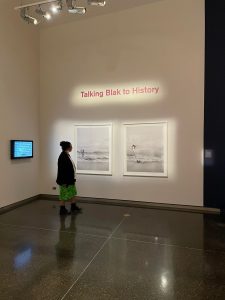
Māori scholar photographs Cook Islands scholar examining Aboriginal artwork confronting White Australian histories at the Australian National Museum, Canberra, April 2023. [click to enlarge]
This is the final reflection from our PhD students who attended the recent Australia Association for Pacific Studies conference in Canberra, by Stacey Kokaua-Balfour.
As someone who has only recently started their PhD, the recent AAPS conference was my first time attending an academic conference. I have come away with not only new questions but the awareness of new geographic and intellectual contexts that might shape those questions. What resonated most with me as someone who has operated in Pacific spaces in Aotearoa for some time, was the way our nation state and its distinct geo-political interests can shape not only how Pacific region and their peoples are framed but also what are considered the most important priorities for academic research.
AAPS was an opportunity to engage with Indigenous thinkers across cultures, nation state borders, languages, breaking across specific colonial interests in the Pacific. The Welcome to Country led by Aunty Serena Williams (Ngunnawal – Wiradjuri) best articulated the idea that as researchers, our best ideas spring from coming together and sharing the distinct and nuanced ways Indigenous peoples engage with land and each other.
Rethinking Australian Coloniality through Pacific Biography
Wanda Ieremia-Allan provides the second of the reflections from our PhD students who attended the recent AAPS conference in Canberra.
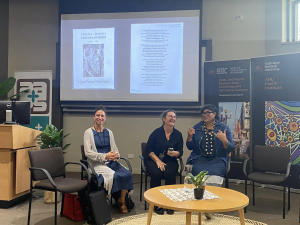
Wanda (right) alongside fellow panel presenters Hineitimoana Greensill and Pauline Reynolds [click to enlarge]
Fleets abound with Pacific scholars, creatives, activists and politicians met at the April 2023 ‘To Hell With Drowning’ Pacific Studies conference at the Australian National University (ANU) in Canberra. As a child of Sapapali’i, Sāoluafata, Safotulafai, Lalomanu, Vaie’e, Matāutu Falealili in Samoa, I extend my Fa’afetai to people of the unceded Ngunnawal and Ngambri lands (Canberra Australia) for their warm welcome and hospitality to country. Thank you also to the Australian Association for Pacific Studies (AAPS) organising committee led by Professor Katerina Teaiwa and Talei Mangioni for their care. Fa’afetai to the AAPS for the Guy Powles travel prize that made it possible for me to attend and I am grateful to my supervisors Dr. Jess Pasisi (Otago), Professor Alice Te Punga Somerville (UBC) and Tootooleaava Dr. Fanaafi Aiono Le-Tagaloa (USP Samoa) for their unwavering support and guidance. Thank you especially to Dr Jess Pasisi for the academic manaakitanga extended to many PhD students.
On a panel with Dr Pauline Reynolds of the Norfolk Island Museum and PhD student Hineitimoana Greensill, I presented my paper on Indigenous Pacific language archives and its role in ‘Rethinking Australian Coloniality through Pacific Biography’. Utilising the intersections between Professor Epeli Hau’ofa’s notion of the ‘totality of relationships’[1] and Māori scholar Professor Alice Te Punga Somerville’s poem ‘Room’[2] provided an opportunity to think about: ancestral links; ideological connections; and spaces of reckoning and recovery.
My paper focussed on Samoan historiography and the kinds of work that are made possible when we centre on Samoan language archives as sites of Indigenous knowledge production and historical recovery. This resulted in the emergence of an intellectual, geographical, linguistic and cultural Pacific expansiveness alongside the rich long standing embodied stories of Pacific connectivity that not only interrogate pervasive Australia white settler colonial histories but demand more institutional university spaces to conduct decolonial work with our languages. Samoan language archives recovered links with fellow kin, in particular South Sea Islanders of Mer Island, Torres Strait Island region where Samoan missionaries and local Mer Island people established the London Missionary Society church named ‘O le Sulu Samoa’ in 1902. Letters from Badu Islands and Vanuatu recovered family histories and brought to light the many ways in which Pacific Islanders see each other and connect over oceans of memory.
Advocating for the use of our own epistemological paradigms in archival engagement is necessary because as matua Tuaopepe Albert Wendt asserts ‘Oceania deserves more than an attempt at mundane fact; only the imagination in free flight can hope, if not to contain her, to grasp some of her shape, plumage and pain’[3]. This is the wero (challenge) set for us all.
[1] Hau’Ofa, E. (1994). Our sea of islands. The Contemporary Pacific, 148-161.
[2] https://nzpoetryshelf.com/2021/05/24/poetry-shelf-noticeboard-alice-te-punga-somervilles-room/
[3] Wendt, Albert, 1982. Towards a New Oceania. In: G. Amirthanayagam. (eds) Writers in East-West Encounter: New Cultural Bearings. London: Palgrave Macmillan, pp 202-215.
Reflections on ‘To Hell With Drowning’ AAPS Conference 2023
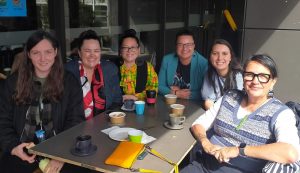
With fellow Māori scholars (L-R): Sam Iti Prendergast, Alice Te Punga Somerville, Marama Salsano, Innez Haua, Karamea, Jo Maarama Kāmira
The following is a reflective piece from Karamea Moana Wright, one of Te Tumu’s PhD candidates in Pacific Islands Studies.
The first Australia Association for Pacific Studies’ conference I participated in was held primarily online in 2021, with separate hubs in Aotearoa and Australia. Because we were in groups on our own campuses, I don’t think I fully understood the magnitude or value of the conference and the association itself until this month, when I attended for the first time in person.
The four days in Canberra at the Australian National University were packed with phenomenal panels, plenaries, roundtables, and whakawhanaungatanga with incredible Pacific thinkers, researchers, artists, leaders, and poets influential in our region and discipline.
This conference opened my eyes in greater measure to salient contemporary conversations taking place in the field, how my own research sits within the broader landscape of Māori, Pacific, and Indigenous Studies, and to see what is possible in my work moving forward. The AAPS conference has left me hopeful, motivated, refreshed, rejuvenated, and encouraged, underscoring the necessity to return for the next AAPS conference in 2023, held in Sydney.
Wonderful achievement for Te Tumu PhD candidate
Te Tumu PhD candidate Wanda Ieremia-Allan is now bound to the UK on a University of Cambridge fellowship to research the historical legacy of the Samoan periodical, O Le Sulu Samoa, a newspaper that has been active for 184 years.Otago’s Bulletin Board wrote a great article on Wanda’s achievement and the background of her interest in this newspaper. Click here to read more.
Te Tumu Seminar: transcending low levels of literacy and numeracy for Pacific people.
Maulupeivao Dr Betty Ofe-Grant is a lecturer from Auckland University of Technology Business School, researching Pacific peoples’ issues in labour migration, careers, glass ceilings, diversity, gender, intersectionality, literacy and numeracy and work. She is also the acting Vice President for the National Council of Women, New Zealand, and a matai (Samoan chief).
Password: 959841
Pacific people in New Zealand are among the most disadvantaged ethnic groups who over-represent the adult working-age population with low literacy and numeracy skills. Individuals with low literacy and numeracy tend to experience higher levels of marginalisation, vulnerability, cycles of poverty and significant risks of poor health and well-being.

